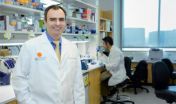(Press-News.org) VIDEO:
Jonathan Kurtis, M.D., Ph.D., director of the Center for International Health Research at Rhode Island Hospital, talks about the latest findings in their research to find a vaccine for malaria,...
Click here for more information.
PROVIDENCE, R.I. – Rhode Island Hospital researchers have discovered a protein that is essential for malaria-causing parasites to escape from inside red blood cells. Antibodies to this protein trap the parasite inside these red blood cells. This protein could lead to the development of a vaccine that would prevent the progression of Plasmodium falciparum malaria, which kills one child every 15 seconds each year in Sub-Saharan Africa and Southeast Asia, according to new research by Jonathan Kurtis, M.D., Ph.D., and colleagues, published in the May 23 issue of journal Science.
"This research really began in 2002 when our colleagues from the National Institutes of Health, led by Patrick Duffy and Michal Fried, enrolled a birth cohort of children in Tanzania," said Kurtis, director of the Center for International Health Research at Rhode Island Hospital, and the study's principal investigator. "Six years ago we began using these samples to identify novel vaccine candidates and now it's coming full circle. While a portion of this research was conducted in mice, the actual vaccine discovery experiments were performed using human samples, thus we believe the results will effectively translate to humans."
In the mouse experiments, researchers conducted five independent vaccine trials in which mice were vaccinated with the novel antigen, which they have designated as Schizont Egress Antigen-1 (PfSEA-1) or control. All mice were then challenged with malaria parasites. In all five experiments, vaccinated mice had lower levels of malaria parasites and survived longer than the unvaccinated mice.
"When my post-doctoral fellow Dipak Raj discovered that antibodies to this protein, PfSEA-1, effectively trapped the malaria-causing parasite within the red blood cells, it was truly a moment of discovery,'" Kurtis said. "Many researchers are trying to find ways to develop a malaria vaccine by preventing the parasite from entering the red blood cell, and here we found a way to block it from leaving the cell once it has entered. If it's trapped in the red blood cell, it can't go anywhere… it can't do any further damage."
The researcher then measured antibodies to PfSEA-1 in the entire Tanzanian birth cohort of 785 children. Surprisingly, among children with antibodies to PfSEA-1, there were zero cases of severe malaria. To generalize their results, researchers then went back to a serum bank they had collected from 140 children in Kenya in 1997. They found that individuals with antibodies to PfSEA-1 had 50 percent lower parasitemia than individuals without these antibodies during a high transmission season.
"We still have additional trials ahead of us, first in another animal model, but we hope to begin Phase I trials in humans very soon," Kurtis said. "Our findings support PfSEA-1 as a potential vaccine candidate, and we are confident that by partnering with our colleagues at the National Institutes of Health and other researchers focused on vaccines to prevent the parasites from entering red blood cells, we can approach the parasite from all angles, which could help us develop a truly effective vaccine to prevent this infectious disease that kills millions of children every year."
Scientists at Rhode Island Hospital/Brown University led the discovery of PfSEA-1 and scientists at NIAID led the epidemiological studies in endemic areas, with contribution of scientists at Harvard Medical School and the University of Washington, which was partially supported by NIAID grants R01-AI52059 and R01-AI076353.
INFORMATION:
ARTICLE:
DK Raj et al. Antibodies to PfSEA-1 block parasite egress from RBCs and protect against malaria infection. Science. DOI: 10.1126/science.1254417 (2014).
This work was supported by grants from the US National Institutes of Health (R01-AI076353 to Kurtis, R01-AI52059-to Duffy); Intramural Research Program of the NIAID-NIH; the Bill & Melinda Gates Foundation grant awarded to Duffy (1364); grants from the NIH awarded to Jeffrey Dvorin of Boston Children's Hospital (R01-AI102907 and DP2-AI112219); and an internal Lifespan Hospital System Research Pilot Award Grant to Kurtis. Kurtis' principal affiliation is Rhode Island Hospital, a member hospital of the Lifespan health system in Rhode Island. He also has an academic appointment at The Warren Alpert Medical School of Brown University, Department of Pathology and Laboratory Medicine. Other researchers include Dipak K. Raj, Christian Nixon, Christina Nixon, Sunthorn Pond-Tor, Lauren Pischel, Ailin Lu, Ling Cheng and Emily McDonald, all of the Center for International Health Research at Rhode Island Hospital; Hai-Wei Wu, Ian Michelow and Jennifer Friedman of the Center for International Health Research, and the Department of Pediatrics at Rhode Island Hospital; Grant Jolly and Solomon Conteh of the Department of Pathology and Laboratory Medicine at Rhode Island Hospital, all are affiliated with the Alpert Medical School of Brown University; Jeffrey Dvorin, Christen DiPetrillo and Sabrina Absalon of the Division of Infectious Diseases at Boston Children's Hospital and Harvard Medical School; Sarah Holte of the Fred Hutchinson Cancer Research Cener Program in Biostatistics and Biomathematics at University of Washington Seattle; and Michal Fried and Patrick Duffy of the Laboratory of Malaria Immunology and Vaccinology at the National Institute of Allergy and Infectious Diseases, part of the National Institutes of Health.
About Rhode Island Hospital
Founded in 1863, Rhode Island Hospital in Providence, R.I., is a private, not-for-profit hospital and is the principal teaching hospital of The Warren Alpert Medical School of Brown University. A major trauma center for southeastern New England, the hospital is dedicated to being on the cutting edge of medicine and research. Last year, Rhode Island Hospital received more than $55 million in external research funding. It is also home to Hasbro Children's Hospital, the state's only facility dedicated to pediatric care. For more information on Rhode Island Hospital, visit http://www.rhodeislandhospital.org, follow us on Twitter @RIHospital or like us on Facebook http://www.facebook.com/rhodeislandhospitalpage.
RI Hospital researcher and colleagues discover protein that may lead to malaria vaccine
Malaria kills 1 child every 15 seconds in Sub-Saharan Africa, Southeast Asia
2014-05-22
ELSE PRESS RELEASES FROM THIS DATE:
Growing inequalities make science more of a 'winner takes all' field
2014-05-22
ANN ARBOR—As new research documents growing inequalities in health and wealth, the gap between "haves" and "have-nots" is growing in the field of scientific research itself, says University of Michigan sociologist Yu Xie.
"It's surprising that more attention has not been paid to the large, changing inequalities in the world of scientific research, given the preoccupation with rising social and economic inequality in many countries," said Xie, research professor at the U-M Institute for Social Research and professor of sociology, statistics and public policy.
The forces ...
Fruit flies show mark of intelligence in thinking before they act
2014-05-22
Fruit flies 'think' before they act, a study by researchers from the University of Oxford's Centre for Neural Circuits and Behaviour suggests. The neuroscientists showed that fruit flies take longer to make more difficult decisions.
In experiments asking fruit flies to distinguish between ever closer concentrations of an odour, the researchers found that the flies don't act instinctively or impulsively. Instead they appear to accumulate information before committing to a choice.
Gathering information before making a decision has been considered a sign of higher intelligence, ...
Collecting biological specimens essential to science and conservation
2014-05-22
ANN ARBOR—Collecting plant and animal specimens is essential for scientific studies and conservation and does not, as some critics of the practice have suggested, play a significant role in species extinctions.
Those are the conclusions of more than 100 biologists and biodiversity researchers who signed a letter to the journal Science scheduled for online publication May 22.
The letter is a response to an April 18 Perspectives article in Science arguing that alternative methods of documentation—such as high-resolution photography, audio recordings and nonlethal tissue ...
Newborn health improves despite income gap
2014-05-22
The U.S. economic inequality gap has been widening for decades, and research shows that maternal disadvantage may have health consequences for newborns. A review of recent economic research, however, finds that the health of newborns has actually improved nationally in recent years, despite data that would suggest otherwise.
"That was really surprising to us," said Anna Aizer, associate professor of economics at Brown University. Aizer and Janet Currie of the National Bureau of Economic Research and Princeton University published the review in a special issue of Science ...
Ancient DNA ends Aussie claim to kiwi origins
2014-05-22
Australia can no longer lay claim to the origins of the iconic New Zealand kiwi following University of Adelaide research published in the journal Science today showing the kiwi's closest relative is not the emu as was previously thought.
Instead, the diminutive kiwi is most closely related to the extinct Madagascan elephant bird – a 2-3 metre tall, 275 kg giant. And surprisingly, the study concluded, both of these flightless birds once flew.
A new study by the University of Adelaide's Australian Centre for Ancient DNA (ACAD), has solved a 150-year-old evolutionary ...
Scientists identify potential vaccine candidate for pediatric malaria
2014-05-22
WHAT:
Researchers have identified a substance, or antigen, that generates antibodies that can hinder the ability of malaria parasites to multiply, which may protect against severe malaria infection. The antigen, known as PfSEA-1, was associated with reduced parasite levels among children and adults in malaria-endemic areas. Mice exposed to PfSEA-1 in an investigational vaccine also experienced lower malaria parasite levels. The discovery of PfSEA-1 could be a critical addition to the limited pool of antigens currently used in candidate malaria vaccines. The findings, which ...
Lower mantle chemistry breakthrough
2014-05-22
Washington, D.C.—Breaking research news from a team of scientists led by Carnegie's Ho-kwang "Dave" Mao reveals that the composition of the Earth's lower mantle may be significantly different than previously thought. These results are to be published by Science.
The lower mantle comprises 55 percent of the planet by volume and extends from 670 and 2900 kilometers in depth, as defined by the so-called transition zone (top) and the core-mantle boundary (below). Pressures in the lower mantle start at 237,000 times atmospheric pressure (24 gigapascals) and reach 1.3 million ...
Deep earth recycling of the oceanic floor
2014-05-22
Scientists from the Magma and Volcanoes Laboratory (CNRS/IRD/Université Blaise Pascal) and the European Synchrotron, the ESRF, have recreated the extreme conditions 600 to 2900 km below the Earth's surface to investigate the melting of basalt in the oceanic tectonic plates. They exposed microscopic pieces of rock to these extreme pressures and temperatures while simultaneously studying their structure with the ESRF's extremely powerful X-ray beam. The results show that basalt produced on the ocean floor has a melting temperature lower than the peridotite which forms the ...
Delegating the dirty work is a key to evolution
2014-05-22
EAST LANSING, Mich. — We have hundreds of types of cells in our bodies – everything from red blood cells to hair follicles to neurons. But why can't most of them create offspring for us?
New research at Michigan State University suggests that separating germ cells – sperm and eggs –from somatic cells – all other cells – preserves the genetic building blocks while allowing organisms to flourish in a somewhat hazardous environment.
The results, which appear in the current issue of PLOS Biology, show that having somatic cells do the organism's dirty work helps explain ...
Researchers identify key mechanism in metabolic pathway that fuels cancers
2014-05-22
DALLAS – May 22, 2014 – In a breakthrough discovery at the Children's Medical Center Research Institute at UT Southwestern (CRI), a research team led by Ralph DeBerardinis, M.D., Ph.D., has taken a significant step in cracking the code of an atypical metabolic pathway that allows certain cancerous tumors to thrive, providing a possible roadmap for defeating such cancers.
Published in Cell Reports, and following up on Dr. DeBerardinis' landmark finding in 2011, this most recent discovery identifies the triggering mechanism that plays a key role in causing a series of ...
LAST 30 PRESS RELEASES:
Roadmap for Europe’s biodiversity monitoring system
Novel camel antimicrobial peptides show promise against drug-resistant bacteria
Scientists discover why we know when to stop scratching an itch
A hidden reason inner ear cells die – and what it means for preventing hearing loss
Researchers discover how tuberculosis bacteria use a “stealth” mechanism to evade the immune system
New microscopy technique lets scientists see cells in unprecedented detail and color
Sometimes less is more: Scientists rethink how to pack medicine into tiny delivery capsules
Scientists build low-cost microscope to study living cells in zero gravity
The Biophysical Journal names Denis V. Titov the 2025 Paper of the Year-Early Career Investigator awardee
Scientists show how your body senses cold—and why menthol feels cool
Scientists deliver new molecule for getting DNA into cells
Study reveals insights about brain regions linked to OCD, informing potential treatments
Does ocean saltiness influence El Niño?
2026 Young Investigators: ONR celebrates new talent tackling warfighter challenges
Genetics help explain who gets the ‘telltale tingle’ from music, art and literature
Many Americans misunderstand medical aid in dying laws
Researchers publish landmark infectious disease study in ‘Science’
New NSF award supports innovative role-playing game approach to strengthening research security in academia
Kumar named to ACMA Emerging Leaders Program for 2026
AI language models could transform aquatic environmental risk assessment
New isotope tools reveal hidden pathways reshaping the global nitrogen cycle
Study reveals how antibiotic structure controls removal from water using biochar
Why chronic pain lasts longer in women: Immune cells offer clues
Toxic exposure creates epigenetic disease risk over 20 generations
More time spent on social media linked to steroid use intentions among boys and men
New study suggests a “kick it while it’s down” approach to cancer treatment could improve cure rates
Milken Institute, Ann Theodore Foundation launch new grant to support clinical trial for potential sarcoidosis treatment
New strategies boost effectiveness of CAR-NK therapy against cancer
Study: Adolescent cannabis use linked to doubling risk of psychotic and bipolar disorders
Invisible harms: drug-related deaths spike after hurricanes and tropical storms
[Press-News.org] RI Hospital researcher and colleagues discover protein that may lead to malaria vaccineMalaria kills 1 child every 15 seconds in Sub-Saharan Africa, Southeast Asia



